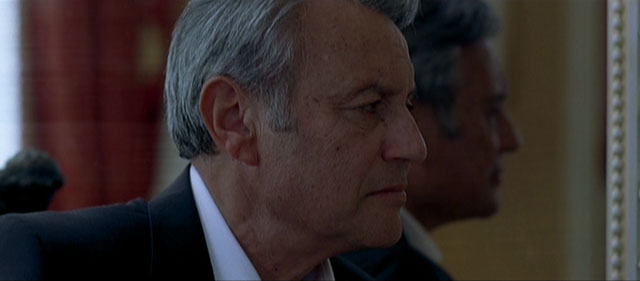Movie opens on a border patrolwoman (Florence Loiret Caille, the eaten maid in Trouble Every Day, also in Time of the Wolf), then moves to her husband (Grégoire Colin, upstairs neighbor in 35 Shots of Rum), then quickly to the husband’s father Louis (Michel Subor of Topaz, Anatomy of a Marriage, Le petit soldat) with whom it remains, more or less, for the duration.

Along the way we meet a pharmacist (attractively-freckled Bambou, best known for her relationship with Serge Gainsbourg) who sleeps with Louis, Louis’s dog-owning neighbor (Béatrice Dalle, cannibal Coré in Trouble Every Day, also in Clean and Inside), a sinister blonde woman (Katya Golubeva of Twentynine Palms, Pola X, I Can’t Sleep) who stalks him obsessively, and Louis’s ex in Tahiti who will not help him find his estranged son Tikki. Oh, “and Alex Descas,” proudly proclaims the opening credits, but he only appears in one scene, in close-up, as a priest.

Nobody I’ve talked to seems sure of exactly what happens in this movie. Much of that can be explained by the director’s comment that some of the characters don’t actually exist except in Louis’s imagination – I’m guessing that accounts for his blonde stalker, but I’m not sure who else. Louis abandons his dogs at his wintery shack in northern France, goes to Switzerland to withdraw piles of cash, negotiates the purchase of a ship in Korea, then heads to Tahiti to look for his son (not caring half as much about his other son in France). Along the way, probably in flashback, he gets a heart transplant in Russia, the memory of which seems related to the mysterious stalker. Oh, and back in France he kills somebody with the knife he always carries.

Guy from Tindersticks did the music without his band – it’s quiet and upsetting and wonderful. Played at Venice with 3-Iron, The World, Kings & Queen and The Sea Inside, but lost to Vera Drake. Between this movie and Trouble Every Day, I’m thinking the director of Martyrs could be a Claire Denis fan.

Story interpretations vary, although apparently it helps immensely to read the essay by Jean-Luc Nancy on which the script was based. In the DVD interview, Denis describes the physical feeling the book gave her, talks about the film being a vehicle for Michel Subor as much as an adaptation of the book. “My producer also was absolutely the most perfect producer for that film, but he was also suffering from a very severe depression, and he killed himself before we finished.” – this is the same producer who worked on The Man From London.

Carson:
The Intruder is loaded with Marxist Dialectics, the kind of suggestive cutting collisions that were pioneered by Sergei Eisenstein. A man describes a scene in the woods to his wife as a way of setting an erotic tone between the two of them, followed by a cut to the man’s father sitting amidst tall pine trees relaxing with his dogs. A priest speaks about the variety of immoral beings in the world, followed by a cut to the film’s blank protagonist, Louis Trebor. … In order to gather any semblance of narrative momentum, one has to look towards the way that the film is essentially divided into three parts, each comprised of a different locale, though not entirely limited to it, and connected by the theme of travel and intended self-renewal. … his lonely woodland cabin on the French-Swiss border, Pusan [South Korea], and Tahiti. … The film’s tempo steadily decreases … By the finale in Tahiti, The Intruder feels like a completely different work than what its opening anticipated. The shots lengthen, the soundtrack becomes quieter, comedic scenes appear, and Denis begins interspersing the action with footage from an unfinished 60’s film called Le Reflux, also set in Tahiti and starring Michel Subor.

Claire Denis in Senses of Cinema:
My films are not highly intellectual, and L’Intrus is like a boat lost in the ocean drifting, you know? I think that’s the way I picture it … Even if it’s the dream of a voyage, I think it was very important for me that the film offer the two sides of the globe, the north hemisphere and south hemisphere, as the two sides of the heart.
He’s not aware of the people still around who love him. He has no respect for that. The only woman he’s gentle to, the woman with the dogs played by Béatrice Dalle, it’s because she doesn’t care for him that he’s attracted by her beauty. I would imagine that if she would let him enter her house and open her heart to him, he would disrespect her immediately. So I think Trebor is not a very lovable man. Politically, I would say he represents everything I dislike in my country, this sort of selfish-solitude mentality … So I’m happy that he is condemned at the end: He is defeated, and I think it’s only fair. But it’s interesting to me that this main character is someone I do not respect. I understand I can suffer from his anxiety, but I don’t like him. When I wrote the script, I called him A Man With No Heart, a heartless man.
[Subor] had read the script and I gave him those new [Johnny Cash] songs to listen to because I wanted him to be inspired. I told him, “Probably I will never use this as music for the film”, but I wanted him to feel that death is coming closer, to hear that voice, that man in Cash’s last two records whose life has been rich and full of love and emotion. And there is a trembling, as if the moment is coming.
For further study I rewatched Claire Denis’s episode of Ten Minutes Older in which L’Intrus author Jean-Luc Nancy talks endlessly in a train car about French homogeneity and foreigners as intruders, but didn’t find it any more interesting than last time.